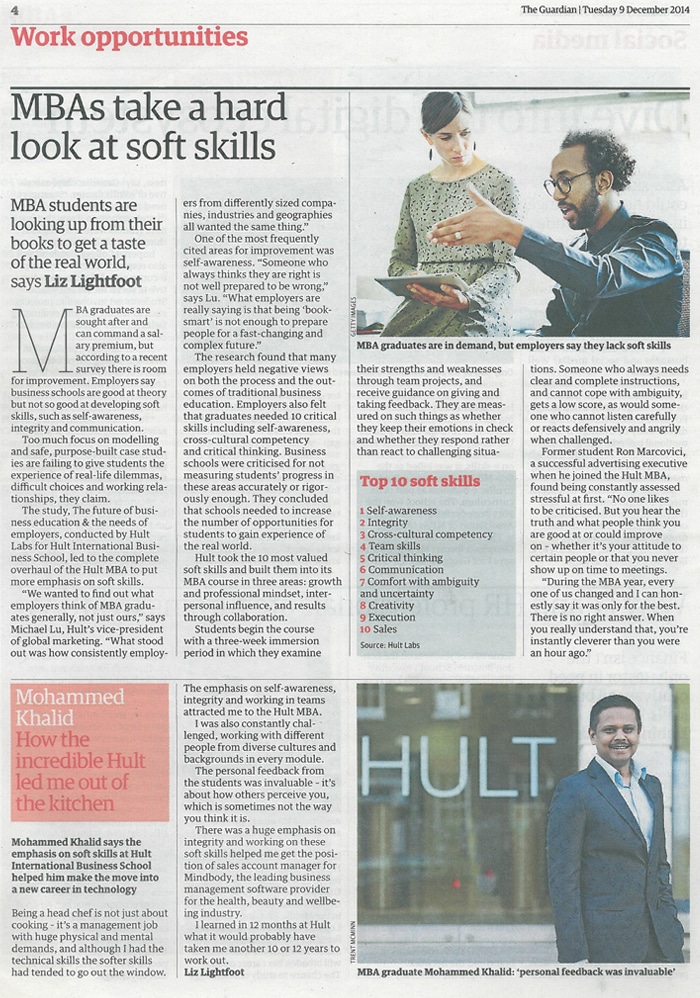This article was originally published on December 9, 2014, in The Guardian, ‘MBAs need to teach soft skills’.
MBA graduates are sought after and can command a salary premium, but according to a recent survey there is room for improvement. Employers say business schools are good at theory but not so good at developing soft skills, such as self-awareness, integrity and communication.
Too much focus on modelling and safe, purpose-built case studies are failing to give students the experience of real-life dilemmas, difficult choices and working relationships, they claim.
The study, The future of business education & the needs of employers, conducted by Hult Labs for Hult International Business School, led to the complete overhaul of the Hult MBA to put more emphasis on soft skills.
“We wanted to find out what employers think of MBA graduates generally, not just ours,” says Michael Lu, Hult’s vice-president of global marketing. “What stood out was how consistently employers from differently sized companies, industries and geographies all wanted the same thing.”
One of the most frequently cited areas for improvement was self-awareness. “Someone who always thinks they are right is not well prepared to be wrong,” says Lu. “What employers are really saying is that being ‘book-smart’ is not enough to prepare people for a fast-changing and complex future.”[Tweet “Being ‘book-smart’ is not enough to prepare people for a fast-changing and complex future.”]
The research found that many employers held negative views on both the process and the outcomes of traditional business education. Employers also felt that graduates needed 10 critical skills including self-awareness, cross-cultural competency and critical thinking. Business schools were criticised for not measuring students’ progress in these areas accurately or rigorously enough. They concluded that schools needed to increase the number of opportunities for students to gain experience of the real world.
Hult took the 10 most valued soft skills and built them into its MBA course in three areas: growth and professional mindset, interpersonal influence, and results through collaboration.
Students begin the course with a three-week immersion period in which they examine their strengths and weaknesses through team projects, and receive guidance on giving and taking feedback. They are measured on such things as whether they keep their emotions in check and whether they respond rather than react to challenging situations. Someone who always needs clear and complete instructions, and cannot cope with ambiguity, gets a low score, as would someone who cannot listen carefully or reacts defensively and angrily when challenged.
Former student Ron Marcovici, a successful advertising executive when he joined the Hult MBA, found being constantly assessed stressful at first. “No one likes to be criticised. But you hear the truth and what people think you are good at or could improve on – whether it’s your attitude to certain people or that you never show up on time to meetings.
“During the MBA year, every one of us changed and I can honestly say it was only for the best. There is no right answer. When you really understand that, you’re instantly cleverer than you were an hour ago.”
Mohammed Khalid says the emphasis on soft skills at Hult International Business School helped him make the move into a new career in technology.
“Being a head chef is not just about cooking – it’s a management job with huge physical and mental demands, and although I had the technical skills, the softer skills had tended to go out of the window. The emphasis on self-awareness, integrity and working in teams attracted me to the Hult MBA.
“I was also constantly challenged, working with different people from diverse cultures and backgrounds in every module.
“The personal feedback from the students was invaluable – it’s about how others perceive you, which is sometimes not the way you think it is.
“There was a huge emphasis on integrity, and working on these soft skills helped me get the position of sales account manager for Mindbody, the leading business management software provider for the health, beauty and wellbeing industry.
“I learned in 12 months at Hult what it would probably have taken me another 10 or 12 years to work out.”
Top 10 soft skills
1 Self-awareness
2 Integrity
3 Cross-cultural competency
4 Team skills
5 Critical thinking
6 Communication
7 Comfort with ambiguity and uncertainty
8 Creativity
9 Execution
10 Sales


Source: Hult Labs
Make the most of what your career has to offer with a Masters in International Business from Hult. To learn more, take a look at our blog Masters of International Business: Connect locally, build internationally, or give your employability a huge boost with an MBA in international business. Download a brochure or get in touch today to find out how Hult can help you to explore everything about the business world, the future, and yourself.


![MBAs need to teach soft skills [The Guardian]](https://www.hult.edu/blog/media/uploads/2014/12/NYC-Academic-1280x720.jpg)